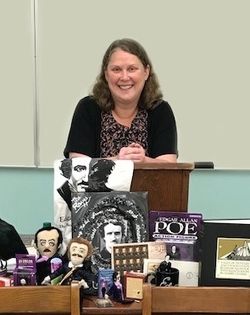Fall 2024 MHC Special Topics and Colloquia
MHC colloquia classes offer a distinctive academic experience, combining the depth of specialized study with the breadth of interdisciplinary exploration. These courses are designed to engage intellectually curious students in intensive discussions, research, and critical analysis of complex topics. Unlike traditional lecture-based classes, honors colloquia emphasize interactive learning, encouraging students to actively participate in debates, collaborative projects, and experiential learning opportunities.
Click below to explore Fall 2024 colloquia course offerings. To view past semesters, click on the sub-menu to the right.

Mindsets Matter: Exploring the Power of Mindsets |Tuesdays/Thursdays 9:35 - 10:55, HCIC 3024
Do you think intelligence/ability (or personality) is largely fixed or malleable? Do you see stress (or self-doubt) as debilitating or motivating? Do you see depression as a disease or as a signal that serves a purpose? Do you believe that people are in control of their emotions and actions? This seminar will explore how mindsets (i.e., implicit beliefs about aspects of the self or of the world) impact our reactions and adaptation to objective reality. Over the course of a semester, students will be challenged to think critically about research from various areas of psychology (e.g., educational, developmental, social, clinical), which suggests that our thoughts, beliefs, and expectations significantly impact performance, well-being, and resilience.
Specifically, students will explore research on the factors that influence mindsets such as socio-cultural experiences. Students will uncover how mindsets about ability, personality, self-doubt, depression, anxiety, stress, etc. impact academic, social, and mental health resilience. Students will also explore the mediators and moderators of the relationships between adaptive mindsets and the outcomes. Finally, students will have the opportunity to consider real world applications of these connected lines of research and consider the ethical implications of mindset interventions.
Throughout the class, students are expected to play an active leader role in reading, thinking, discussing, writing, and presenting. The instructor will guide the learning process by providing relevant readings, facilitating discussions, designing rubrics for writing assignments, and helping students develop a research proposal of their own.

Chinese Martial Arts | Tuesdays/Thursdays 11:10 - 12:30, HCIC 2021
Chinese martial arts, often referred to as Kung Fu or Wushu, constitute a diverse and ancient system of martial practices that have evolved over thousands of years in China. This martial tradition encompasses a wide spectrum of fighting techniques, self-defense skills, and physical exercises. Chinese martial arts transcend mere combat; they also represent a profound cultural and philosophical discipline, emphasizing values like discipline, respect, and self-improvement.
This discipline comprises various styles and schools, each distinguished by its unique techniques, forms, and philosophical foundations, thereby making it a rich and multifaceted practice of Chinese culture and history. Furthermore, Chinese martial arts have significantly influenced Chinese literature, art, film, language, sport science, and hold a prominent place in not only in China but also East Asia and the world.
This course embarks on a captivating interdisciplinary journey as we delve into the multifaceted realm of Chinese martial arts and their profound impact on culture. It transcends boundaries, weaving together literature, film, art, philosophy, religion, language, history, sociology, and cultural studies to provide a comprehensive understanding of the rich tapestry of Chinese martial arts. By taking this course, you will explore how Chinese martial arts have shaped and been shaped by Chinese culture, identity, and society throughout history, unveiling the profound role they play in the individual’s personal identity and the nation’s collective consciousness.
You will delve into the deep philosophical and spiritual roots that underlie Chinese martial arts, exploring concepts of discipline, honor, and enlightenment that have permeated the practice for centuries. Engaging in cross-cultural comparisons, you will consider how Chinese martial arts have transcended borders to influence East Asian and global cultures and societies. As the course progresses, you will develop critical thinking skills by evaluating and critiquing various representations of Chinese martial arts in cultural works, dissecting their significance and impact.

Jazz and the Civil Rights Era | Tuesdays/Thursdays 12:45 - 2:05, HCIC 2017
This course investigates the relationship between jazz music and campaigns for civil rights from the mid-nineteenth century to the present, focusing especially on the Civil Rights Movement, c.1954–76. For context, we will begin with nineteenth-century Minstrelsy, then move to the formation of the Blues in the early decades of the 20th century. We will primarily study jazz styles like New Orleans, Swing, Bebop and Modern Jazz through the lens of segregation and the civil rights movement, as reflected in the music of musicians like Duke Ellington, Billie Holiday, Abbey Lincoln, Nina Simone, Miles Davis, Max Roach, John Coltrane, and Charles Mingus.
Key questions we tackle in class: The politics of music is often discussed in terms of a song’s text, though jazz is a musical idiom that is often textless. How can textless music be political? How has the music we call “jazz” come to symbolize so many different and sometimes contradictory political tendencies—freedom and democratic values, a threat to order and civil society, the possibility of integration and racial harmony, Black liberation and nationalism, conservatism, surrealism, socialism, etc.—throughout the twentieth century? What is it about jazz that enables people to read their political aspirations and hopes in what is primarily instrumental, improvised music?

The Reagan Presidency: Lessons for Today? | Tuesdays/Thursdays 12:45 - 2:05, HCIC 2016
As the 2024 presidential campaign continues to unfold, most Americans are dissatisfied with the choice between President Biden and former President Trump, yet the 2024 election is anticipated to be very consequential for the nation and for the world.
In this current context, can any lessons be learned from past American presidents? This course addresses this question by closely examining the Reagan presidency, 1980-1988. Students will then critically discuss and debate those features of the Reagan presidency that may be historically unique and confined to the eighties, but also those features of his presidency that may be relevant as lessons to Trump, Biden, and the nation today.

Torture in Fiction and Film | Mondays/Wednesdays 3:25 - 4:45, HCIC 2007
This course will consider both the concept and the lived experience of torture in the fictional context of literature and film. We will consider the political, moral, philosophical, social, and criminal aspects of torture as represented in fictional contexts. Toward the end of the course, we will examine the meaning of torture to the torturee, the torturer, the in-text audience, and ourselves as members of the reading/viewing audience. Perhaps the pain of looking in the mirror is worst of all.

Checkmate - Chess Strategy for Life | Tuesdays/Thursdays 2:20 - 3:40, HCIC 2001
Chess playing is a core part of the class with an emphasis on how players develop the art of strategy making. Strategy comes through learning from others and developing the skill of thinking beyond the present or past in the hope an opponent will act as desired. Part of this process involves experiencing and learning from mistakes. The practice of learning requires reflection and correction to help succeed. Successful strategists and chess players apply these lessons. This class involves playing chess for enjoyment and appreciation. Through this approach, as well as readings and discussion, we will explore practical applications of strategy for our lives.
The purpose of the class is to illustrate, through play, how lessons can be gleaned in developing a personal strategy for life that considers the implications of our choices, capitalizes on opportunities, and learns from mistakes.

William Faulkner: Selected Short Stories | Tuesdays 12:45 - 2:05, HCIC 2007
William Faulkner, one of America’s most famous Nobel laureates, adopted the short-story format for some of his most important work. These stories not only introduce the reader to the author’s imaginary Yoknapatawpha County but also to his legendary Faulknerian style, a style which, according to him, was an endeavor “to put the history of mankind in one sentence.”
In this course, students will actively participate in dissecting some of Faulkner’s legendary long sentences and in analyzing a given story’s meaning and craftsmanship. Following a reading quiz or short writing assignment, we will cover one story per week, around fourteen or fifteen by the end of the semester.

